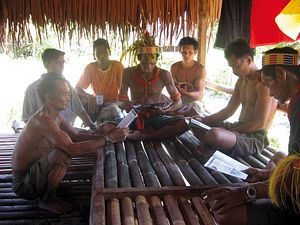In a time of near universal dependence on the English language, it is all too easy to dismiss the importance of linguistic diversity across the globe. This diversity, however, is under threat.
An estimated 90 percent of 6,700 languages spoken throughout the world today will disappear within the next 100 years and 40 percent — some 2,680 languages — are in immediate danger of becoming extinct, as their last fluent speakers grow older and pass away. The majority of these languages are in Asia, the world’s most linguistically diverse area.
As a result, the United Nations has announced 2019 as the International Year of the Indigenous Language (IYIL). This campaign seeks to raise awareness of the role languages play in First Nation communities and their ties to education, history, tradition, and memory.
While the current statistics regarding languages in the Asia-Pacific are alarming, there are still reasons for optimism.
The Mentawai people have lived in the archipelago that shares their name for millennia. The island chain, which lies off the west coast of Sumatra, is politically and socially isolated from the wider Indonesian republic and is incredibly rich in ecological value; Siberut, the chain’s largest island, is a United Nations biosphere reserve. Despite this, the number of Mentawai people actively practicing their ancestral traditions has been reduced to a small number.
As is often the case, the lack of cultural practices has had a dramatic effect on the number of Mentawai language speakers. In local government schools, Mentawai children are encouraged to converse in Bahasa Indonesia, and the presence of mainstream culture is becoming increasingly more apparent.
One Mentawai elder from Siberut conveyed to The Diplomat that most of the community’s younger generation now speak only Bahasa Indonesia. “Most Mentawai children do not know how to speak our own language, which makes it almost impossible for them to understand our culture and the taboos that guide us,” he said. “It is devastating.”
Moreover, the rise of tourism in recent years has increased exponentially in the archipelago, with large-scale development projects further challenging both traditional lifestyles and the island’s biodiversity. One of the proposed projects is a highway that will traverse Siberut from the south to the north, cutting through a swathe of forest.
In these critical times, members of the Mentawai community are fighting to keep their language alive.
Leading the charge is Yayasan Pendidikan Budaya Mentawai (YPBM), a cultural education foundation based on Siberut island, whose members are currently in the process of collating a Mentawai dictionary. In essence, the dictionary will translate Mentawai into Bahasa Indonesia, which in turn will be translated into English. There is also work on establishing a verbal dictionary, with the aim to keep the language relevant and spoken by young people and older generations alike.
Speaking to The Diplomat, YPBM chairman, Fransiskus Yan, outlined that his organization considers the preservation of language paramount to ensure the future of Mentawai culture. “Our younger generation are not learning Mentawai language because of foreign influence and this is already having enormous flow-on effects across the community,” he said. “Our language is our identity and without this there will be a big hole in our culture and our soul.”
Yan further discussed with The Diplomat the unique process of transcribing oral language. There are immediate challenges that need to be addressed, as certain Mentawai words do not translate easily into foreign languages.
For example, the Mentawai word sitamaniu refers to a person who doesn’t have a sister; there is no singular word to describe this in either Bahasa Indonesia or English.
Similarly, when translated literally, the Mentawai phrase pulu mongi would imply that a person was referring to a time 10 days in advance; in Mentawai, it actually means very early the following morning.
Despite these challenges, the Mentawai dictionary project has been embraced by the community of Siberut island, and its widespread support in the community has enabled YPBM to deepen its partnership and collaboration with NGO the Indigenous Education Foundation (IEF).
President of the IEF, Australian Rob Henry, has lived with the Mentawai people for the best part of a decade. He outlined to The Diplomat that the dictionary project was an opportunity to unify the Mentawai community around the common goal of preserving their traditions. “Indigenous languages and cultures survive if the community are willing to adapt to the ever-evolving circumstances, conflicts, and changes they undergo,” explained Henry.
“Given the inextricable link between cultural identity and language, developing a Mentawai language dictionary enables the community to retain the spirit of their culture, whilst moving with confidence to determine their future.”
Yan agrees. “By maintaining and celebrating Mentawai language for future generations, we empower confidence and pride in our children,” he said. “They will be able to speak with our elders and people outside of Mentawai without fear or shame.”
Nick Rodway and Grace Dungey are writers based in northern Australia. Their reporting on environmental and First Nations affairs has been appeared in a wide range of international media, including Al Jazeera, Dateline, and Mongabay.

































